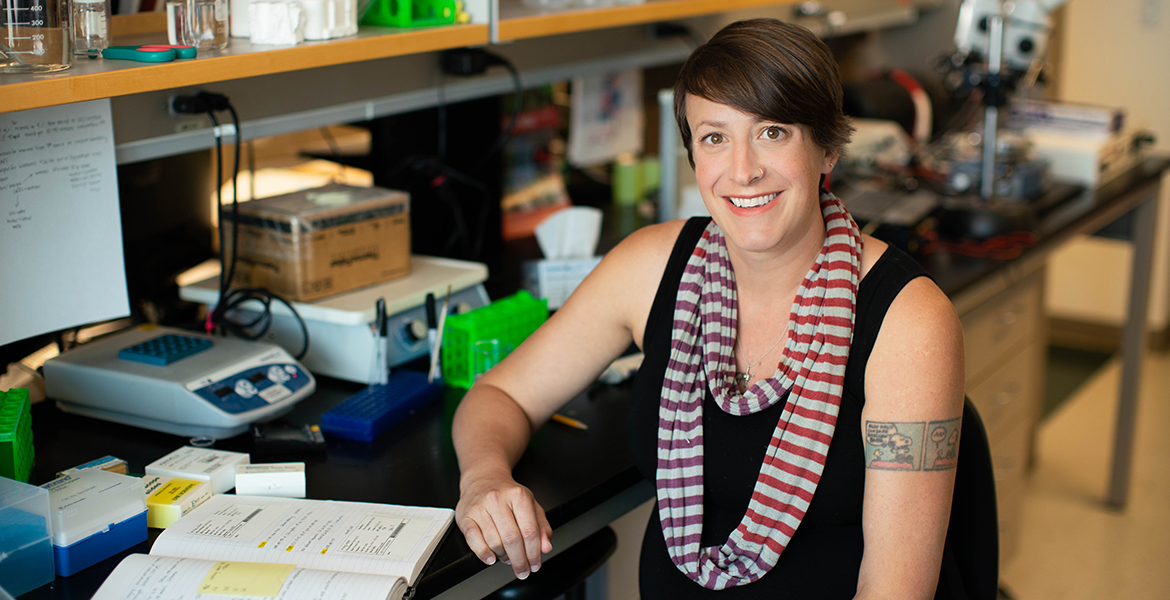
Directory connects STEMM experts and diversifies representation
Tuesday, March 30, 2021
Frustrated by the lack of various backgrounds on scientific panels, Department of Integrative Biology professor Dr. Elizabeth McCullagh set out to fix the problem in 2018 with the help of Dr. Katarzyna Nowak of The Safina Center and Dr. Jane Zelikova of the University of Wyoming.
Together they created Request a Woman in STEMM, a database where underrepresented people in science, technology, engineering, mathematics and medicine (STEMM) can not only connect and collaborate with each other, but also be called upon by journalists, conference organizers or others who need an expert opinion.
“I was sitting in scientific meetings where time after time there were all male panels — or ‘manels,’” McCullagh said. “I thought, ‘Why are just white men being represented here? Is it because people can’t find other speakers, or is it because these really are the experts?”
Having grown the directory from about 7,000 in its first year to nearly 15,000 in 2020, McCullagh knows now that increasing the visibility of all STEMM professionals was ultimately about providing the right resource. And in an effort to expand the Request a Woman in STEMM database even further, it was relaunched in January with a new look and a new name: Gage, named for women’s rights activist Matilda Gage.
“She was amazing — all the different things she did and then also didn't get credit for it,” McCullagh said. “That’s the whole idea behind the Matilda Effect: that men often get the credit for women's accomplishments. So we thought it was the perfect domain. If you’re going to choose somebody to represent your database, it should be somebody who represents getting more recognition for folks who deserve it.”

McCullagh explained that in addition to the name change being a strategic marketing move (making it shorter and easier to remember), it also better reflects the inclusivity the co-founders were aiming for.
“We started to recognize that having ‘women’ in the title left out a lot of people who are also marginalized in the scientific community,” McCullagh said. “We really wanted to expand it to be women and underrepresented gender minorities so that non-binary people or trans women feel more included in the database.”
“It’s been a great tool to bring visibility to the contribution of women and gender minorities in science. And visibility matters,” added Zelikova, who co-founded Gage’s host site, 500 Women Scientists, a grass-roots organization. “We are excited to keep growing Gage’s functionality and reach across the world.”
That functionality includes being searchable by discipline, location and other keywords. The Gage database was also made purposefully public-facing so that users can easily find and contact STEMM professionals.
“Now that the platform is available in six languages, we want to expand representation within the database and make sure it’s useful to anyone who needs a science expert anywhere in the world,” Zelikova said.
And who exactly is an expert on Gage? It doesn’t necessarily mean someone with a Ph.D.
“We have high schoolers on there who say, ‘Yeah, I'm a good coder, so I'm an expert in code, and I'd be happy to talk about it,’” McCullagh said. “Everybody has something to offer. I encourage anybody and everybody to sign up and be represented.”
McCullagh explained that Gage’s growth so far has been mostly grassroots — through word of mouth and Twitter — but the hope is to expand exponentially in coming years as full-time employees join the organization’s volunteer staff.
“Our big 10-year goal is that Gage becomes like Google: you are going to use it anytime you need a resource for anything. It will be the natural, first place you go,” McCullagh said. “It’s easy to stick with the status quo ... but we're trying to break that down and have people actively assess the choices they make to see if there are better alternatives.
“… We need to recognize who is at the table and who's not, and then make sure that those people have a voice.”
MEDIA CONTACT: Elizabeth Gosney | College of Arts and Sciences | 405-744-7497 | egosney@okstate.edu
